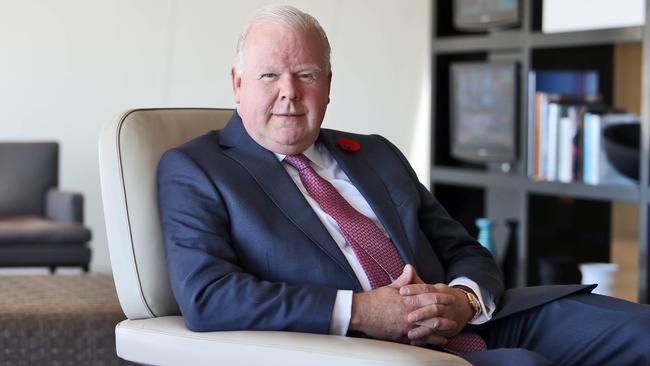Mike Smith: We’re slow to catch digital wave
The financial services sector has only felt the initial tremors from powerful disruptive forces, says Mike Smith.

The financial services industry is rooted in the old economy and has only felt the initial tremors from powerful disruptive forces, according to former ANZ Bank chief executive Mike Smith.
Mr Smith, who has embraced the start-up community and innovation after “doing my bit” in large listed companies, presented a future where banks would connect their data to build a complete behavioural and predictive view of the customer, like Amazon.
Goods and services could also be bartered through an exchange, together with the development of a non-physical, more global currency — possibly a digital version like bitcoin.
“Technology is going to drive exponential change and we’re only just at the beginning, so some of the things we’ve held on to, such as sovereign currencies, may well disappear,” he told The Australian in an interview.
“I think what you will find is a much better exchange — effectively barter of goods and services — and we’ll move to a more global currency, but it won’t actually be a physical thing.
“It used to happen in the Middle Ages but it was very inefficient because it was limited to a confined area, but it’s an interesting concept if you can make it incredibly efficient by pricing it properly.”
After eight years running ANZ and spearheading its super-regional strategy, Mr Smith left the bank at the end of 2015. While Mr Smith last month told The Australian about the “unintended consequences” of the $6.2 billion bank levy, he declined to be drawn on the debate over the new tax.
Late last year, the career banker, who has held top executive roles with London’s HSBC, became chairman of Melbourne start-up incubator York Butter Factory, which focuses on innovation across the board rather than just fintech.
Mr Smith gave his thoughts on the future of financial services at an event hosted by Fintech Victoria that was attended by about 200 entrepreneurs.
Asked for his most contrarian view on fintech, Mr Smith said he believed that Australia was actually a long way behind in its transition to a digitally powered economy compared to other countries such as Singapore, or even Britain, an early adopter of open data.
“I think we’re not match-fit and we have a long way to go,” he said. “We’re not hungry for change. We don’t see it as necessary because we’ve been successful for so long. Believe me, it is necessary.
“I also believe that banks can’t be disrupted easily. Beware of the thought that they can, because banks are actually better at this stuff than you think — there are very few industries in the world that use technology like banks do.”
Mr Smith lamented the fact that innovation had slipped off the national agenda, despite Malcolm Turnbull talking up a storm about it when he first became prime minister.
The problem, he said, was that people had interpreted the message to mean that the “robots are coming” and great swathes of jobs would be lost.
The opportunity had been missed to stress that innovation was the key to job opportunities for our children.
YBF is an incubator that also has a venture fund, through which Mr Smith has exposure to some start-ups. He has also invested in a British battery technology company underpinned by Australian technology, and a digital authentication company in the healthcare industry.
He said fintechs offered the potential for “more fundamental than incremental change”.
The thing to remember about banks was their long history of adapting quite rapidly to changing circumstances.
“They operate in a big paddock with lush grass, and in Australia the four of them go to the same corner to eat the grass,” Mr Smith said. “And they’re surrounded by a high fence, which is regulation, and that makes it hard for them to get out but also hard for others to get in.
“So for fintech to really work, you have to think how to get through the fence and get to that grass, or find even richer grass outside the fence. That’s actually the best option.”
Mr Smith homed in on two “overhyped” fintech niches that hadn’t delivered according to expectations — peer-to-peer or marketplace lending, and blockchain. He said many P2P companies would not survive a serious credit downturn.
As to blockchain, the concept of the distributed ledger and integrity of data was “incredibly important”, but no one had yet worked out how to bring it all together and do it well.
“That must happen at some stage because the beauty of it is it costs virtually nothing,” he said.
“The great problem with banking is that any transaction, particularly the transfer of money, is expensive. It relies on huge infrastructure in the existing banking industry, so if you can bypass that and find a way of maintaining the integrity of the transfer, that’s obviously going to be a winner.”
He advises start-ups to think carefully about the industry they are targeting. Contrary to the view of Scott Morrison, he said the profit margin in Australian banking was relatively thin, as opposed to the US, for example. “I think the US is actually quite a nice market to play in,” Mr Smith said.
“Here we’re good at the research side and the government has actually got it right in terms of the tax breaks for research, but the trouble is we don’t do the commercialisation.
“But hey, I hear so many good ideas all the time that it’s amazing I have any money left!”



To join the conversation, please log in. Don't have an account? Register
Join the conversation, you are commenting as Logout